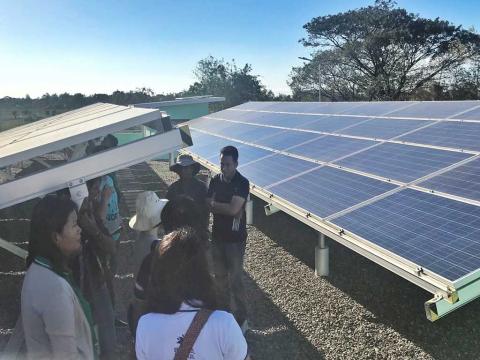The group takes a look at the installed SPIS in Llanera, Nueva Ecija which was officially turned over by the DA RFO III and RU Foundry and Machinery Shop to barangays Caridad Norte and Sur on February 4, 2019. (photo by Janina Drueco)
MUÑOZ, Nueva Ecija—Different agencies including the Agricultural Training Institute (ATI) and the Technical Educational Skills and Development Authority (TESDA) are leading a series of activities for the development of training regulations (TRs) on the different functions and competencies needed for the solar-powered irrigation system (SPIS).
In line with Department of Agriculture (DA) Secretary Emmanuel Piñol’s directives, four TRs have been initially identified for the Installation National Competency (NC) II and III; operation and maintenance NC II; and repair and services NC III.
Other agencies involved are DA Regional Field Office (RFO) III, Bureau of Agricultural and Fisheries Engineering, Philippine Fiber Industry Development Authority, Bureau of Soils and Water Management, Central Luzon State University, Agricultural Machinery Manufacturers and Distributors Association Foundation Inc., RU Foundry and Machine Shop Corporation, Postharvest Development and Mechanization, and DA RFO VI.
The SPIS is an irrigation system powered by solar energy, instead of fossil fuel or electricity. This DA-led project is seen to aid in irrigating portions of agricultural areas to meet the national food requirement of our country’s growing population.
In a workshop on functional analysis for SPIS, 14 experts from the concerned agencies crafted a functional map to describe the industry functions and the individual occupations or jobs down to the individual worker it entail.
The group also visited the site of the installed SPIS in Llanera, Nueva Ecija, a pilot project of the DA RFO III to enhance and sustain rice production in the upland rainfed areas. They were welcomed by the municipal agriculturist, Elizabeth Pacada, and cooperative chairman, Paulino Mimis, who is also the overall manager in the operation and maintenance of the SPIS.
Furthermore, experts from the RU Foundry and Machine Shop Corp., the company that installed the SPIS, and DA RFO III explained technical details on how the whole irrigation system runs.
The TRs, as well as the competency assessment tools and assessment fees, are expected to be finalized and promulgated by the end of the year. Additional experts from other relevant agencies and offices will also be invited for the second of the series of workshops slated.
The activity was held at the Philippine Carabao Center in this town last February 12-14.

